
'It wasn't not racist': Netflix documentary charts the troubling rise of Abercrombie & Fitch
Abercrombie & Fitch's website is, today, awash with Gen-Z-friendly nods to diversity and inclusion. There are people of color, sizes up to 3XL and even a Pride-themed collection featuring "gender inclusive" rainbow tees. The brand's Instagram account, meanwhile, proudly promotes models in wheelchairs, stories of body-positivity and statements of LGBTQ solidarity.
Yet, barely disguised in the label's new tagline, "This is #AbercrombieToday," is an admission that there is a yesterday it would rather we forget.
Any chance of that has been effectively dashed by Netflix's new documentary "White Hot: The Rise & Fall of Abercrombie & Fitch," which charts Abercrombie's transformation from forgotten 19th-century outdoors retailer to the epitome of late-'90s teen fashion. Through interviews with former models, recruiters, store workers and executives, the 88-minute film suggests that appearing cool, attractive and White wasn't just an exercise in branding: it was an active corporate strategy that came at the expense of non-White employees and consumers.
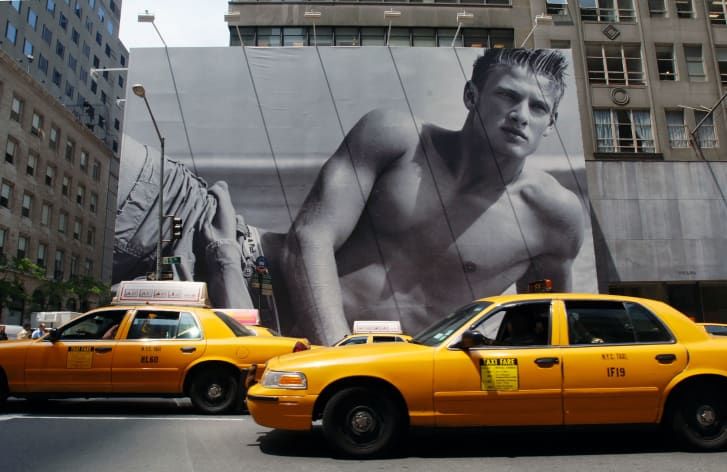 Cabs drive in front of a Abercrombie & Fitch billboard in New York in 2005.
Cabs drive in front of a Abercrombie & Fitch billboard in New York in 2005.
For all the current messages of inclusion, millennials (and older) will remember an altogether different Abercrombie -- one that took over malls and billboards with an army of attractive models and ripped male torsos. One that spread around college campuses and was name-dropped in LFO's 1999 anthem "Summer Girls" ("I like girls that wear Abercrombie & Fitch," sang the band's late vocalist, Rich Cronin. "I'd take her if I had one wish").
As the Washington Post's senior critic-at-large Robin Givhan reflects in the documentary, Abercrombie's explosive success was achieved by combining the sex appeal of Calvin Klein and the elite preppiness of Ralph Lauren -- but at prices more affordable than both.
At the time, it seemed the brand could do little wrong. A former merchandiser recalls being told by a colleague that they "could write 'Abercrombie & Fitch' with dog sh*t and put it on a baseball hat and sell it for 40 bucks." One of the brand's former models put it even more succinctly: "If you weren't wearing Abercrombie, you weren't cool."
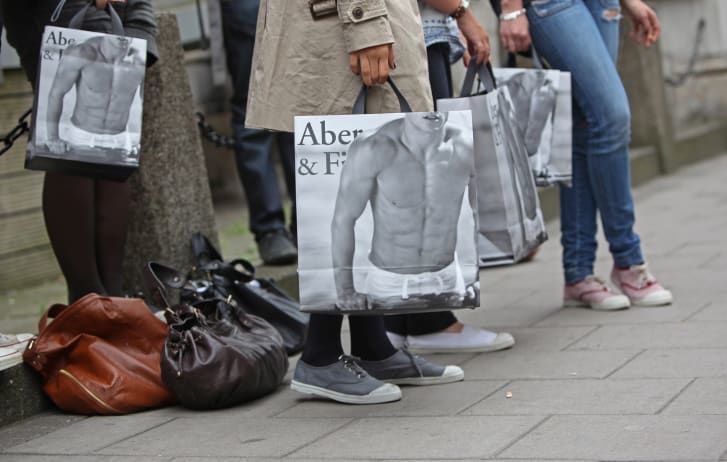 Shoppers hold Abercrombie & Fitch shopping bags outside the store in London, UK, in 2010.
Shoppers hold Abercrombie & Fitch shopping bags outside the store in London, UK, in 2010.
But behind the aura of exclusivity was a policy of, well, exclusivity. In a precursor to today's influencer marketing, the label hunted out good-looking employees and looked to college fraternities and sororities for models and store workers -- a cool-kids-only strategy underpinned by a tacit understanding of whose looks qualified as "all-American." Former staff members reveal in-house guidelines that fall just short of racially explicit language, though descriptions of dreadlocks as "unacceptable," for instance, made the implications clear enough to one ex-recruiter, who says: "It wasn't not racist."
The company declined to comment on specific allegations made in the documentary, though current CEO Fran Horowitz told CNN in a statement: "We own and validate that there were exclusionary and inappropriate actions under former leadership," adding that the company is now "a place of belonging."
"We've evolved the organization, including making changes in management, prioritizing representation, implementing new policies, re-envisioning our store experiences and updating the fit, size-range and style of our products," she said.
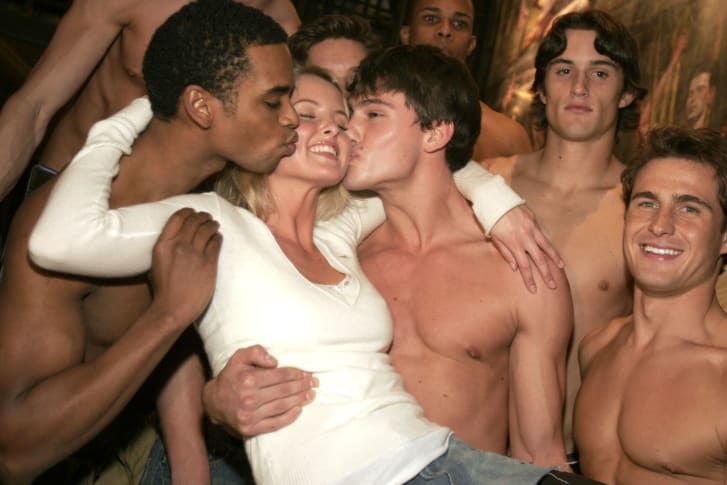 Abercrombie & Fitch models at the opening of the brand's store on New York's 5th Avenue.
Abercrombie & Fitch models at the opening of the brand's store on New York's 5th Avenue. 'Are we exclusionary? Absolutely'
The company began facing accusations of wrongdoing from around the turn of the millennium. In 2003, a group of former employees and job applicants sued Abercrombie & Fitch for discrimination. Several of the plaintiffs appear in Netflix's documentary to reiterate longstanding claims that Black, Asian American and Hispanic employees had their hours reduced, were let go or were forced into backroom roles on account of their appearance.
Abercrombie settled the suit in 2004, paying out around $40 million to its accusers. And although the firm never admitted guilt in the case, it did agree to a non-binding Consent Decree that saw a court overseeing improvements to its hiring, recruitment and marketing practices. While there were evident improvements in the diversity seen on Abercrombie's shop floors, the company would later end up in the Supreme Court after a Muslim American woman, Samantha Elauf, claimed she refused a job in 2008 because she wore headscarf. The court ruled 8-1 in her favor.
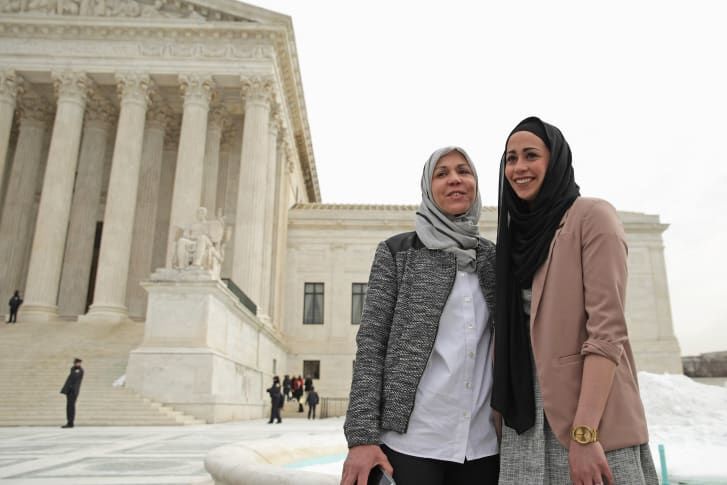 Samantha Elauf outside the US Supreme Court, which voted in her favor in
a case alleging that Abercrombie & Fitch had violated
discrimination laws by declining to hire her because she wore a head
scarf, a symbol of her Muslim faith.
Samantha Elauf outside the US Supreme Court, which voted in her favor in
a case alleging that Abercrombie & Fitch had violated
discrimination laws by declining to hire her because she wore a head
scarf, a symbol of her Muslim faith.
The documentary also revisits other troubling parts of Abercrombie's success story, including its close relationship with fashion photographer Bruce Weber, who has since been accused of sexual misconduct by numerous models. (Weber has always denied the allegations, telling the New York Times in 2017 that he "never touched anyone inappropriately.") Other now-unthinkable decisions include offensive T-shirts that used stereotypical Asian fonts and caricatures, including one featuring the fictional Wong Brothers Laundry Service and its slogan "Two Wongs Can Make it White."
What is shocking about the documentary, however, is not only the nature of the accusations -- many of which have long been in the public domain -- but how long it took for a reckoning to arrive.
Abercrombie made little secret of wanting its clothes to be worn by people who looked a certain way. In 2006, former CEO Mike Jeffries effectively spelled out his tactics in a now-infamous profile on the news site Salon, saying: "We go after the attractive all-American kid with a great attitude and a lot of friends.
A lot of people don't belong (in our clothes), and they can't belong. Are we exclusionary? Absolutely."
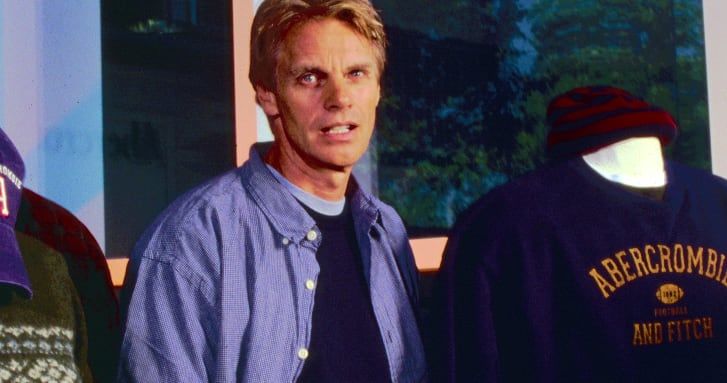 Former CEO of Abercrombie & Fitch, Mike Jeffries.
Former CEO of Abercrombie & Fitch, Mike Jeffries.
The comments went almost unnoticed at the time. It would be well into the next decade before Jeffries' quote -- and the brand's history of problematic marketing and advertising -- became more of a corporate liability. But then, as a young and socially aware generation of customers began taking notice, the floodgates opened.
In 2013, a teenage eating disorder survivor Benjamin O'Keefe started a Change.org petition, signed by almost 80,000 people, that urged the label to offer sizes XL and above. That same year, filmmaker Greg Karber went viral with his #FitchTheHomeless campaign and video, which saw him donating
Abercrombie clothes to homeless people in a riposte to Jeffries' exclusionary approach. Plus-size blogger Jes Baker created a series of inclusive spoof adverts that changed the brand's logo to read "Attractive & Fat."
The next year, Jeffries stepped down as CEO amid declining sales, paving the way for another rebranding exercise. But, like various other documentaries revisiting troubling elements of our not-too-distant past, "White Hot: The Rise & Fall of Abercrombie & Fitch" is less an exposé of what happened under his leadership and more a reflection on what we, as a society, allowed to happen. As the Asian American students who protested the "Wong Brothers" T-shirts in 2002 might well attest, objections to the brand's behavior have always existed -- it's just that someone finally stopped to listen to them.
"There were probably just as many people as there are now who hated what we were doing, who were completely offended, who didn't feel included, who didn't feel represented," reflects one ex-employee near the end of the documentary. "But they didn't have the platform to be able to voice it and now they do."










